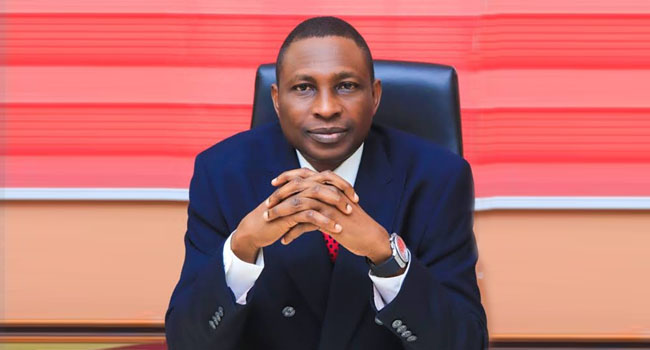The Executive Chairman of the Economic and Financial Crimes Commission (EFCC), Ola Olukoyede, emphasized the importance of young people uniting to tackle the issue of corruption. He pointed out that while corruption impacts all age groups, it has a particularly detrimental effect on the prospects and opportunities of the youth.
Speaking at a town hall meeting organized by the EFCC to celebrate the 2024 World Anti-Corruption Day in Ilorin, Kwara State, Olukoyede stressed the need for collective effort in combating corruption, particularly among the youth.
He highlighted that the prevalence of graft severely limits young people’s chances for personal growth and achievement.
In his message, “Uniting the Youths against Corruption: Shaping Tomorrow’s Integrity,” delivered by the Ilorin Zonal Director of the EFCC, Harry Erin, Olukoyede opined, “Corruption makes our youths vulnerable to fraudulent practices.”
He said: “One of the dreadful effects of internet fraud is its bandwagon effects on youths. The allure of easy money is drawing young people into the vortex of criminality. This explains why our institutions of higher learning are struggling to make students stay away from internet fraud. Any young person who is tainted with cybercrime faces a grim future. There is no sustainable success in internet fraud.”
According to him, “Every young person needs an equal opportunity for self-expression. However, this is impossible in societies where favoritism, nepotism, partisan and other extraneous considerations tilt opportunities in favor of some few privileged people. This is not good for the youths and it is for this reason that they need to forge a united front against corruption.”
The EFCC Chairman expressed his belief that the future of the country lies in the hands of the youth, urging them to reject the temptations of crime and instead embrace honesty and support the Commission’s efforts in fighting corruption.
John Olusola Bayeshea, a Senior Advocate of Nigeria and the Guest Speaker at the event highlighted the widespread corruption in society, stating that “no nation can achieve sustainable socio-economic growth with the level of corruption prevalent in this country.”
While acknowledging the severity of the issue, Bayeshea emphasized the need for a comprehensive approach to effectively tackle corruption, stressing that addressing the sociological factors that enable it is crucial.
According to him, “Nigeria is a country blessed with human and mineral resources, but unfortunately, these resources have been cornered by a few individuals. He said the wealth of this nation is only in the hands of about 2,000 people, which according to him was the reason our youths were leaving the country in the name of“Jappa” to seek greener pastures abroad.
The Guest Speaker, who also spoke from the perspective of God, said “People who are corrupt or who engage in corrupt practices have already been cursed by God unless they repent.” He called on the people in power and the youths to imbibe the virtues of hard work and never see corruption as a lucrative, beneficial, or rewarding v,enture in order not to incur the wrath of God.
Do not take part in the evil delicacies. Stay away from cybercrime and other forms of criminalities that may deliver quick wealth, but with perilous eends, he admonished.
Also speaking, the Kwara State Commissioner for Youths Development, Honourable Ndanusa Usman noted that the fight against corruption can only be won when all stakeholders, particularly the youths, embrace this important fight. He encouraged the youths to serve as role models by shunning crimes and all acts of corruption.
In his remarks, the President National Association of Nigerian Students, NANS, Comrade Issah Abdulghafar, admonished the youths to always remember that they are the leaders of tomorrow and avoid being used to damage the image of the country.
Quoting Shakespeare and Martin Luther King, he said, “If one is not informed, one will be deformed.” He commended the EFCC’s efforts and its initiative aimed at informing and educating the youths, particularly students, by sensitizing them on the need to fight this devastating and endemic scourge that has left the country prostrate and underdeveloped.
Other speakers at the event emphasized the importance of moral reorientation and expressed their support for the government’s efforts, particularly through the EFCC, in combating corruption.
The program brought together stakeholders from key sectors, including youth organizations, heads of government agencies, and development partners.


